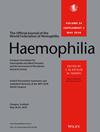Diagnosing moderate haemophilia A (MHA) solely based on deficient FVIII protein levels limits its optimal management and delays the initiation of prophylaxis. Updating protocols and incorporating new variables into its diagnosis could prevent underestimating disease severity, avoiding early arthropathies and impairing patients' quality of life.
To propose recommendations to improve the comprehensive management of people with MHA.
Recommendations from a Spanish panel of eight experts from public comprehensive care centres (CCCs) for people with haemophilia and over 140 people with MHA in follow-up. In a previous analysis, the panel identified the unmet needs of people with MHA and the necessity to develop new specific recommendations for their management.
The panel proposed recommendations in four areas: diagnosis, treatment, follow-up and referrals. They detailed the necessary steps and procedures for the diagnosis, adding other variables to the FVIII levels like bleeding phenotype, genetic profile and joint status to specify the severity and risk classification of people with MHA. Experts proposed an algorithm with unique independent criteria to facilitate the decision to initiate prophylaxis, where the recommended FVIII levels and variables coexist for treatment decision-making. Follow-up proposals addressed periodicity, recommended tests and required visits to CCCs. For referrals, experts proposed criteria and situations considered urgent for a transfer to a CCC for haemophilia patients.
The proposals agreed upon by this expert panel can contribute to update and optimize the management of people with MHA, delaying joint deterioration, pain and disabilities, and improving their quality of life.


